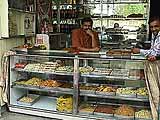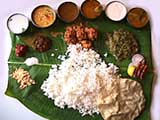 India offers one of the most varied cuisines of any place on the planet. However, many visitors have not been exposed to the full variety of foods that are available in India and tend to stick to the same dishes they order in their favorite Indian restaurant at home. To help people break new ground in ordering, INDAX would like to offer some descriptions of regional specialties you can look for as you travel.
India offers one of the most varied cuisines of any place on the planet. However, many visitors have not been exposed to the full variety of foods that are available in India and tend to stick to the same dishes they order in their favorite Indian restaurant at home. To help people break new ground in ordering, INDAX would like to offer some descriptions of regional specialties you can look for as you travel.
Also, since a lot of Westerners have a bit of difficulty with a constant diet of spicy foods, we've included a few suggestions on Western-style eating for those times you can't face another plate of curried something-or-other. Those unfortunates who have used cutlery all their lives might like to scan the instructions on the gracious art of eating with your fingers. Indian foods are best appreciated with nothing between you and the eating experience.
It is inaccurate to lump all Indian food together as each area has regional variations, though these distinctions are blurring. These days you will find North Indian dishes commonly available in the South, and South Indian specialties in the North. However, there are some distinctive foods commonly served in the South, and we'll try and describe them.
Restaurants
First, a word about restaurants. In India, only a fancy place would call itself a restaurant. Most Indian-style places call themselves "hotels". (Don't go looking for rooms at most of these hotels. You have go to a "Lodge" for that.) Sometimes they are called "cafes" (pronounced Kef), and they are not to be confused with European style cafes.“ The most common Indian hotels, especially in South India, are strictly vegetarian. No meat, no eggs. There are non-vegetarian places, sometimes called "military hotels", and they will serve omelets or fried eggs, as well as veg and non-veg dishes. Most up-scale establishments offer both veg and non-veg cuisine.
The most common Indian hotels, especially in South India, are strictly vegetarian. No meat, no eggs. There are non-vegetarian places, sometimes called "military hotels", and they will serve omelets or fried eggs, as well as veg and non-veg dishes. Most up-scale establishments offer both veg and non-veg cuisine.
In most Indian eating establishments, you do not linger once you've eaten. You order, you eat, you drink a coffee, and pay the bill and leave. In fact, coffee is so clearly the last step of eating that once you order it, you get the bill. This is a bit confusing to the Western traveler used to starting breakfast with a coffee, having another mid way, and then lingering over the final cup. Not done, unless you are in a place that serves Western type food.
If you want to linger - to read a book or newspaper, or leisurely chat with friends - you should try and find a place that allows that. Usually, it will be at least a bit up-scale and pricier. Same with smoking. You cannot smoke in a veg restaurant, though small tea shops will let you. In non-veg establishments it is usually okay. If in doubt, look about on the floor for butts. Ash trays are found only in fancy places.
Picking a good place to eat can be tricky, as it is any where in the world. The bigger the place you are visiting, the better the range of eateries. Busy, popular places are your best bet, and asking the locals for a good hotel usually pays off. You'll soon get an idea what kind of food is served in different kinds of establishments. Experiment with food and with restaurants. You'll be an expert in no time.
You cannot worry too much about dirt. Sanitation standards will not be what you're used to, but if food is freshly prepared and the surroundings regularly cleaned you should be okay. You can only control elements that affect you directly. Make sure the glass, plate and cutlery are clean. Wash your hands well. Carry your own water. If the place has to gleam spotlessly you'll be eating only at five star hotels.
Eating Meat
India is one of the best countries in the world to travel as a vegetarian in, but if you eat meat, you may not want to miss some of the excellent meat dishes served here. However, it is wise not to consume meat on the scale that many do in the West.
India is a hot country, and in the traditional Indian medical thinking, some foods, including meats, heat your body. If you over-consume meat, especially in hot weather, you can create problems in your body. There is an affliction called "overheat" which is attributed to eating too much meat (say chicken twice in one day). There is no Western medical diagnosis that I have heard of, but having had overheat on a couple of occasions I would describe it as some kind of dehydration. You feel awful and your kidneys don't seem to function too well. To counter the effects of "heating" foods, take "cooling" foods, like yogurt and rice. And curb your meat and alcohol consumption in really hot weather.